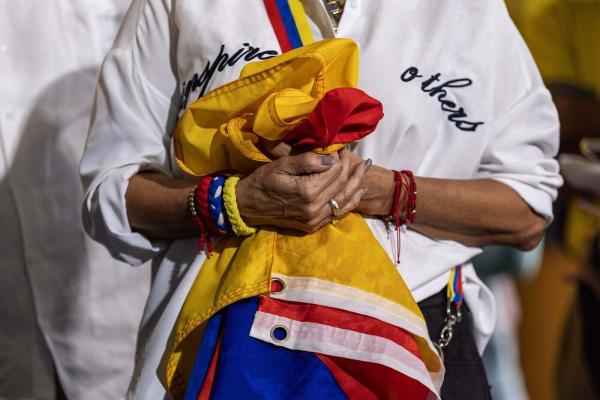When I am acclimating myself to my neighbors, one of the things I enjoy doing is asking them how they came to be my neighbors. You never really know people’s backgrounds, and it’s always interesting to see people light up at the opportunity to tell you a bit about themselves. Very often, both in Washington D.C. and my home state of Texas, I’ll run into people from Ethiopia.
When I went to college in Austin, I got to know a lot of people whose families came from Ethiopia. In getting to know them, I learned about the conflicts that have forced people to leave their homes and to obtain protection under Temporary Protected Status in 2022 due to the nation’s ongoing wars and humanitarian crises. The TPS designation allows migrants to temporarily live in the U.S. when they cannot return to their countries safely, often due to dire circumstances. For the people I met from Ethiopia, TPS offered an escape from physical danger and a chance to thrive here in the U.S. while working to end the conflict back home and caring for their loved ones as best they can.
If we’re considering the parable of the Good Samaritan, we’re much more likely to be seen as sanctioning the robbery and assaults of the stranger.
It is these classmates, neighbors, and friends who have been on my mind as I’ve read about President Donald Trump’s attempts to terminate Temporary Protected Status for Haitians, Hondurans, Nicaraguans, Venezuelans, Afghans, Cameroonians, and Nepalis. Yesterday, a federal court announced that the administration could proceed with ending protections for more than 60,000 people from Nicaragua, Honduras, and Nepal.
TPS can be described as a way our nation embodies the kind of neighbor-love Jesus describes in the parable of the Good Samaritan. In the parable, Jesus describes the Samaritan traveler who finds a man beaten up on the side of the road and lodges the man at a nearby inn, generously paying for the man’s care out of his own pocket (Luke 10:25-37).
But if the U.S. has been the Good Samaritan offering care to those who found themselves in harm’s way, the Trump administration thinks it’s high time we stopped paying for their care. In trying to end TPS for people from various countries, the administration has claimed it’s now safe for those who once needed temporary protection to return home and that criminals have abused the program. “For decades, TPS has been abused as a de facto amnesty program to allow unvetted aliens to remain in U.S. indefinitely,” said an August 1 news release from the Department of Homeland Security. “Too often these programs have been exploited to allow criminal aliens to come to our country and terrorize American citizens.”
READ MORE: James Dobson's Anti-Immigrant Rhetoric Is Dangerous
Neither claim by the Trump administration holds up to scrutiny. Let’s take Venezuela for example: While the Trump administration has terminated TPS status for many Venezuelans living in the U.S., it’s also sending Navy ships to threaten “drug cartels” the administration claims are running the country. Now, we can hold a healthy skepticism of Trump’s claims and his impulse to intervene militarily, but it seems odd for a country to be safe enough for its migrants to return, yet also so unsafe it needs U.S. intervention. Furthermore, the American Immigration Council’s analysis of crime and demographic data found that as shares of the immigrant population grew in the U.S., the crime rate actually fell. In other words, removing TPS status doesn’t protect people from criminals; it just winds up sending people back into recognized conflicts.
So far, tens of thousands of people who had previously been protected by TPS are now living in fear and uncertainty as efforts to end TPS make their way through the U.S. court system. While many of the administration’s attempts have been initially blocked by judges, higher courts are gradually clearing the way for the administration to proceed—unless another court intervenes. This leaves TPS holders in an anxious limbo when they are already monitoring conflicts and disasters at home—a move that demonstrates the administration’s determination to target people who already vulnerable with maximum hostility.
But let’s back up. Theologically, there’s a problem with the Good Samaritan analogy when it comes to TPS: While we may like to think of the U.S. as the Good Samaritan who takes care of vulnerable neighbors, this ignores the role the U.S. has often played in landing people in harm’s way in the first place.
Consider Haiti, one of the countries for which the Trump administration has attempted to revoke TPS, but which is currently being blocked by a federal judge—a decision with which the Department of Homeland Security “vehemently disagrees.” Haiti’s current designation as a TPS-protected country, which began in 2021, was extended in 2024 due to civil conflict on the island. Much of the misery in Haiti is associated with interventions from the United States, with the 1915-1934 occupation, where the U.S. rewrote the Haitian constitution and advanced U.S. financial interests held on the island; we also backed repressive leaders like François “Papa Doc” Duvalier and contributed to decades of mismanaged humanitarian aid, which only worsened conditions.
In 2021 President Jovenel Moïse was assassinated by a squad of hit men some of whom received U.S. training and were allegedly hired and financed by Miami-area companies; in the wake of the assassination, Haiti has faced political instability exacerbated by gang violence and weapons smuggled from U.S. states with lax gun laws. Earlier this month, Trump ally Erik Prince announced a deal in which about 200 personnel from his private security firm would occupy the island to reduce gang violence before taking on a role in the nation’s tax collection—an eerily familiar echo of the U.S. occupation of Haiti in 1915.
This context provides a clear picture of the absurdity of proclaiming that Haitians no longer need temporary protection from conflict. It also highlights the problem of assuming we can simply wash our hands of the well-being of Haitian people here in the United States. If we’re considering the parable of the Good Samaritan, we’re much more likely to be seen as sanctioning the robbery and assaults of the stranger.
Despite the remaining court orders that currently prevent the White House from ending TPS status for thousands of people, the administration seems determined to use its power to keep these communities in limbo and, at worst, send people into situations where their lives will be at risk. All this can make it overwhelming to think of ways to help. And with so many other situations demanding our attention—including images of U.S. troops on our streets—it’s tempting to focus on more personal concerns.
This is the sort of division that the parable of the Good Samaritan obliterates. After the beaten-up man is ignored by religious leaders, it’s ultimately a Samaritan—an outsider—who stops to help. In telling the parable, Jesus makes it clear that it’s the Samaritan whose example we should follow, radical neighbor-love that refuses to see those unlike us as beyond our sphere of concern. Instead, we are all fellow members of a beloved community—and Jesus expects us to treat each other as such.
Right now, this kind of care might be as simple as reaching out to your neighbors with curiosity about where they’re from and forming genuine connections. When we do this, we learn to appreciate the way we depend on each other. And when we recognize this kind of interdependence, it can spur us to other acts of care, such as supporting national organizations that are working to protect TPS-supported communities. Or it might mean visiting a local bakery, coffee shop, restaurant, or worship space you wouldn’t otherwise. When we approach each other and our shared spaces with openness, curiosity, and care, we build the vital connections needed to grow and protect our community and everyone in it. In this way, we build the beloved community when we recognize the image of God truly in us all.
Got something to say about what you're reading? We value your feedback!






